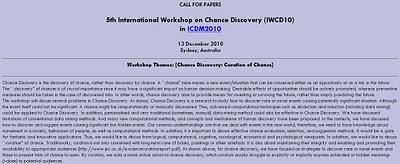
Chance Discovery is the discovery of chance, rather than discovery by chance. A ``chance" here means a new event/situation that can be conceived either as an opportunity or as a risk in the future. The ``discovery" of chances is of crucial importance since it may have a significant impact on human decision making. Desirable effects of opportunities should be actively promoted, whereas preventive measures should be taken in the case of discovered risks. In other words, chance discovery aims to provide means for inventing or surviving the future, rather than simply predicting the future.
This workshop will discuss several problems in Chance Discovery. As shown, Chance Discovery is a research to study how to discover rare or novel events causing potentially significant situation. Although the event itself could not be significant. A chance might be computationally or manually discovered. Thus, advanced computational techniques such as abduction and induction (including data mining) could be applied to Chance Discovery. In addition, personalised and very traditional (sometimes, manual) data mining method could also be effective in Chance Discovery. We have discussed limitations of conventional data mining methods. And many new computational methods, and concepts and mechanisms of human discovery have been proposed. In the contexts, we have discussed how to discover and suggest events causing significant but hidden events. Our common understandings are that we deal with events in the real world, therefore, we need to have knowledge about movement in a society, behaviour of people, as well as computational methods. In addition, it is important to discuss effective chance evaluation, selection, and suggestion methods. It would be a gate for fantastic and innovative applications. Thus, we would like to discuss from logical, computational, cognitive, sociological, economical and psychological viewpoints. In addition, we would like to discuss ``curation'' of chance. Traditionally, curation is not only concerned with long-term care of books, paintings or other artefacts. It is also about maintaining their integrity and enabling and promoting their availability to appropriate audiences (http://www.jisc.ac.uk/e-sciencecurationreport.pdf). As shown above, for chance discovery, we have focused on strategies to discover rare or novel events and those to present hints of chance to users. By curation, we add a more active action to chance discovery, which curators usually struggle to explicitly or implicitly express extended or hidden meanings (values) to potential audiences.

